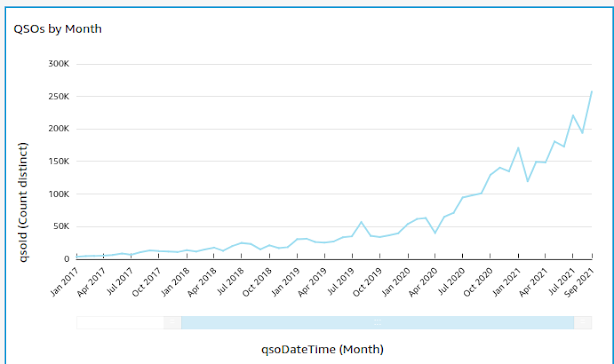A Different Kind of Radio
Several years ago, I read Anthony Doerr’s All the Light We Cannot See for a book club we had at my office. The meaning of the title is layered—the protagonist, for one thing, is blind—but the closest thing to a title drop occurs when one of the characters, while growing up in prewar Germany, listens to a broadcast from a privately-owned (pirate?) shortwave radio station in France. The broadcast is a children’s science lesson, and the topic is the electromagnetic spectrum and how much of it lies outside the range of human sensory experience.
I had a sixth-grade teacher who would often talk about the number of radio signals that were passing through the classroom at that very moment. Broadcasters, air traffic control, police and fire, military communications, ship-to-shore: all of it crossing that room in southern California in all different directions without any of us being aware of it. The world—and by extension the universe—was seemingly awash with information, and all but a trivial fraction of it was at once both under our noses and out of reach.
My grandfather found an old transistor radio lying around the house when I was about ten. He cleaned it up and sent me home with it. The dial had not two, but three bands: AM, FM, and SW. Everyone knew what AM and FM were, but SW was an enigma.
"What's SW?", I would ask.
"Shortwave," was the reply.
"What's shortwave?"
"It's a different kind of radio."
A different kind of radio. I still remember the endless possibilities contained in those five words. Different radio meant different radio stations. Maybe, just maybe, there were stations among them that didn’t suck as much as the mix of disco, cock rock, easy listening, and elevator music found on LA radio in the late ‘70s. There could be better music, or more interesting topics to talk about, things beyond my imagination. And nobody knew any of it was there.
I soon learned that shortwave radio was where one could hear stations from other countries, and it wasn’t long before I logged the BBC World Service as my first international BC. I would go on to listen to the fall of the Berlin Wall on Deutsche Welle and Radio Berlin International. I would monitor SAC bombers on training missions over Utah, airliners bound for Hawaii sending in position reports to a facility in a nondescript industrial park in the Bay Area, Coast Guard rescues off the California coast, and stuff on the high seas radiotelephone service so weird that thirty years later I still won’t talk about it.
In 2019 I tested for my amateur radio Technician license, and upgraded to General a year later. There is much that I find satisfying about wiggling electromagnetic fields. There is, as I discuss on my QRZ page, the tactile nature of it that brings you closer to the metal than a text message or Facebook post ever can. There’s the chance to meet people from all walks of life and literally from all over the world and make new friends.
But there is also a playfully subversive side to it. While most of North America is asleep, I’m making contacts with radio enthusiasts in Australia, New Zealand, Japan, and a number of Pacific Islands, and nobody outside of a few other hams and shortwave listeners are even aware such activity is taking place. The signals pass through homes and farms and ships and planes and factories. They cross the largest ocean on the planet. And yet they remain hidden behind the veil of sensory limitations and lack of time and equipment—at once both under our noses and out of reach.



Comments
Post a Comment